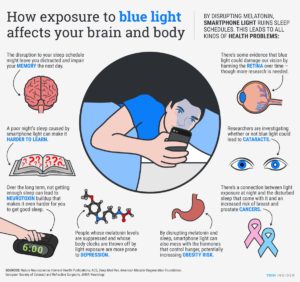 Exposure to light and dark is a critical component of circadian rhythm and health. Bright natural light during the day helps regulate melatonin production. Stimulating blue-wavelength light, which is strongest in the mornings, has the most powerful effect on the circadian cycle. So having an early wake time and exposure to morning light is important. However, blue light after dark can be a surprisingly powerful sleep disrupter. One of the biggest things we know that affects sleep is use of any kind of electronics before bed. Blue light is produced by computer, phone, and tablet screens as well as energy-efficient light bulbs. This can throw off our natural rhythm and circadian system. It is recommended to “power-down” all screens at least an hour before bedtime. If that isn’t possible, try an app that dims the blue-wavelength on your devices, such as f.lux or twilight. You may even try to keep all lights on dim after dinner or consider getting red light bulbs for the bedroom. Some other helpful apps/devices for parents to use to help monitor screen use/time are the Disney Circle device and OurPact (free-app).
Exposure to light and dark is a critical component of circadian rhythm and health. Bright natural light during the day helps regulate melatonin production. Stimulating blue-wavelength light, which is strongest in the mornings, has the most powerful effect on the circadian cycle. So having an early wake time and exposure to morning light is important. However, blue light after dark can be a surprisingly powerful sleep disrupter. One of the biggest things we know that affects sleep is use of any kind of electronics before bed. Blue light is produced by computer, phone, and tablet screens as well as energy-efficient light bulbs. This can throw off our natural rhythm and circadian system. It is recommended to “power-down” all screens at least an hour before bedtime. If that isn’t possible, try an app that dims the blue-wavelength on your devices, such as f.lux or twilight. You may even try to keep all lights on dim after dinner or consider getting red light bulbs for the bedroom. Some other helpful apps/devices for parents to use to help monitor screen use/time are the Disney Circle device and OurPact (free-app).
Other things that can help with sleep are keeping a consistent sleep and wake times to keep your bodies clocks synchronized. This means keeping to the same bed time and wake times throughout your week, weekdays and weekends alike. A consistent wake-up time is the most critical element for circadian health. It is also advised to not sleep past 7am, as an early rise routine helps ensure melatonin will naturally rise around 8-9pm to help you fall asleep. Another recommendation is to finish your evening meal 2-3 hours before bedtime. The body is less equipped to break down and digest food at night, so it’s better to stop eating earlier in the evening.
-Sarah Caudle, PA-C



